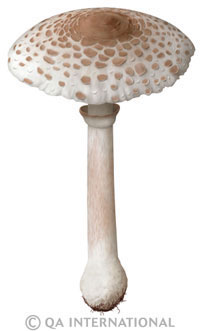Gastroenteritis, when food makes you sick
Gastroenteritis is an inflammation of the mucous membrane in the stomach and intestines, causing diarrhea and vomiting, among other symptoms. It is most often caused by an infection from the ingestion of water or food that has been contaminated by pathogens, such as bacteria, viruses (noroviruses or rotaviruses), or intestinal parasites. Gastroenteritis can also be caused by dietary intolerances or food poisoning. Food poisoning is the result of ingesting foods that contain toxic substances (poisonous mushrooms, ground beef, or mayonnaise contaminated by a toxin, etc.).
Diarrhea and its relief
Diarrhea resulting from infectious gastroenteritis begins suddenly. In most cases, gastroenteritis disappears spontaneously after a few days of rest and a diet of high-calorie liquids (electrolyte solutions). Taking antidiarrheal medication can temporarily relieve the symptoms, but may delay elimination of the pathogen and the patient’s recovery. These medications should only be used when necessary (e.g. if you need to travel).
Noroviruses
Noroviruses are highly contagious viruses that are responsible for gastroenteritis (stomach flu). They are usually transmitted by contaminated water or food, especially seafood. They can also be passed from one person to another when standards of hygiene have not been followed. The symptoms of gastroenteritis appear 1–2 days after contamination and then disappear spontaneously 2–3 days later.
Salmonellae
Salmonellae are infectious diseases of the intestines, caused by bacteria of the Salmonella genus. Contamination comes from the consumption of water or food that has been infected by these bacteria (dairy products, raw eggs, poultry, and seafood). The first symptoms of gastroenteritis appear 12–24 hours after ingestion of the contaminated products. In most cases, people recover spontaneously within 3–5 days. However, in people with a weakened immune system, the infection may be more severe and may require hospitalization and the administration of antibiotics.
Traveler’s diarrhea
Traveler’s diarrhea is a form of infectious gastroenteritis contracted while traveling abroad. Also called “Montezuma’s revenge,” it is generally caused by the consumption of water or food contaminated with the bacteria Escherichia coli, although it can also be caused by a virus or parasite. Symptoms usually disappear after a few days. If they persist, or if they are accompanied by a high fever or blood in the stool, a doctor should consulted.
Botulism
Botulism is a rare but serious form of food poisoning caused by a toxic substance produced by the bacterium Clostridium botulinum. Contamination comes from eating infected food, most often contaminated meat or poorly sterilized preserves. The first symptoms of gastroenteritis (abdominal pain, vomiting, and diarrhea) are followed by disruptions of the nervous system: difficulties in terms of swallowing, speaking, and vision. The more severe forms of botulism lead to paralysis and cardiac and respiratory problems, which can sometimes be fatal.
Food poisoning from poisonous mushrooms
A number of mushrooms are poisonous, meaning they contain substances that are toxic to human beings when ingested. Some examples are the death cap, the fly agaric, and the red-brown parasol. The consumption of poisonous mushrooms leads to gastroenteritis or a variety of more serious ailments. Symptoms may appear anywhere between 15 minutes and more than 10 hours after consumption of the poisonous mushroom. Treatment depends on the toxin that was ingested and on the severity of the symptoms. Medical assistance over several days may be necessary in some cases. To prevent poisoning, have a specialist identify any mushrooms you gather and do not place different species in the same container.
 |
 |
 |
Hamburger disease
Hamburger disease got its name from its primary cause: undercooked ground beef. This is a form of food poisoning caused by a toxin produced by the bacterium Escherichia coli O157:H7, which is present in cow intestines and which can contaminate meat prepared at the time of slaughter. The symptoms of the resulting gastroenteritis are usually limited to strong abdominal pain and diarrhea (sometimes with blood). There may also be a moderate fever. In children under the age of 15, this illness may be more severe and may lead to acute kidney failure, requiring dialysis.
See also:
- The "Food and kitchen" section in the Visual Dictionary
- Edible mushrooms: a treat you shouldn’t fear




